Inside the campaign: Labor feared David Crisafulli threat years out
At a celebratory 2019 dinner in Switzerland after her pitch to the IOC, Annastacia Palaszczuk took a senior journalist aside. While Brisbane had essentially secured the 2032 Games, all she wanted to discuss was David Crisafulli.
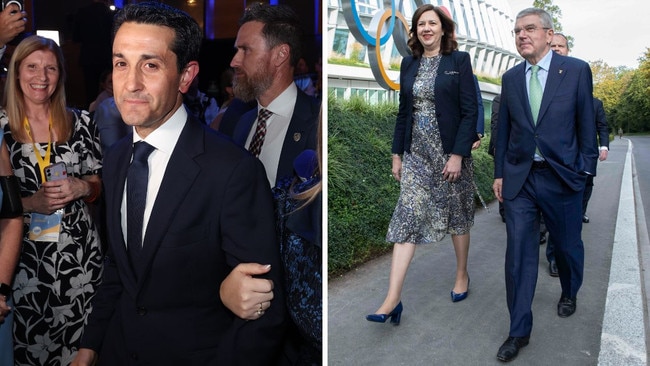
Labor saw David Crisafulli coming from a long way out. At a celebratory dinner in Lausanne, Switzerland, in September 2019 he was on then premier Annastacia Palaszczuk’s mind when she took a senior journalist aside.
The champagne was flowing at the glittering Beau-Rivage Palace hotel as the then Queensland premier raised a glass to the success of Brisbane’s 2032 Olympics bid, nailed down that day in her presentation to the International Olympic Committee.
But Palaszczuk was focused on what was next for Crisafulli. Would he go for the Liberal National Party leadership? Did he have the numbers? She confided, sotto voce, that the Gold Coast-based MP was the one who worried her most on the opposition team.
“She said she feared him,” the journalist remembers. “I was surprised that she was so focused on him because here we were in Lausanne at this beautiful hotel where Phil Collins had been married and all she wanted to do, after Brisbane had basically won the Olympic Games, was talk about Crisafulli.”
As it turned out, the LNP man bided his time. He disavowed a clumsily executed internal putsch against then leader Deb Frecklington, now a senior member of his incoming cabinet, and Palaszczuk chalked up her third win on the trot at the 2020 state election, conducted at the height of the Covid pandemic.
While the LNP banked a slight uptick in its vote, as did Labor, it went backwards on the seat tally.
This created the proverbial “mountain” that Crisafulli climbed on Saturday to return his party to power after a decade in the political wilderness, securing 16 additional seats on the 35 the LNP took into the 2024 state election. Labor under Steven Miles, who succeeded Palaszczuk last December, faced the voters with 51 seats.
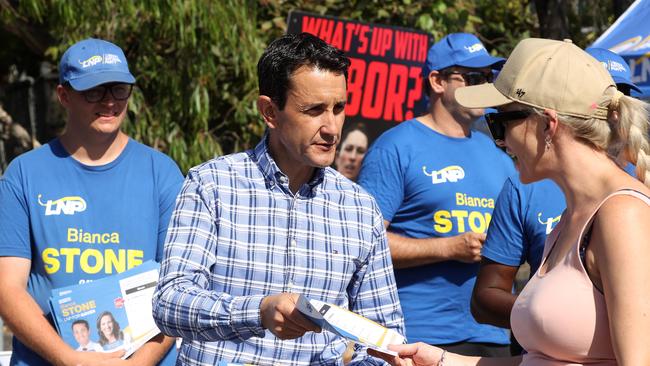
Premier-elect Crisafulli is on track to take office with a strong majority in the 93-seat parliament. In other circumstances, the victory would rate as a landslide.
This achievement should not be underestimated. The LNP might be the richest Coalition franchise in the country – and the only division constituted as a full merger of the major parties of the right – but its record at the state level in Queensland has been woeful. As Crisafulli pointed out until he was blue in the face, his side had won just one state election since Joh Bjelke-Petersen’s last hurrah in 1986 and had occupied the treasury benches in state parliament for barely five of the past 35 years under Rob Borbidge (1996-98) and Campbell Newman (2012-15), where he cut his teeth as a rookie minister.
The LNP campaign was a reflection of its leader’s political persona: disciplined, relentless, focused – in this case on the issues of youth crime, public healthcare, cost of living and housing affordability. Especially youth crime.
Crisafulli built his pitch around the surge in home invasions committed by often violent juvenile offenders, sometimes with lethal consequences. Public anger was white hot, particularly in Queensland’s far-flung regions. Crisafulli did everything he could to fan the flames heading into the election.
It would reap rich dividends for the LNP. Labor’s primary vote fell to just under 33 per cent, in line with The Australian’s election-eve Newspoll, against 42 per cent for the LNP, a statewide swing to it of 6 per cent. But this was far from uniform, reflecting Queensland’s unique demographics. Half the population lives outside the state capital and those constituencies – big city, provincial centres and the bush – vote differently.
On Saturday, the swing to the LNP gathered pace as the distance from the Brisbane GPO lengthened. Starting at 5.6 per cent in the metropolitan area, it strengthened to 7.8 per cent in the outer suburbs and nudged 10 per cent in some regions. The seat of Rockhampton, a Labor bastion for a century, was swept up by the rising tide. Townsville’s three Labor-held seats fell, along with Mackay – which had been ALP property for all but five of the past 109 years.
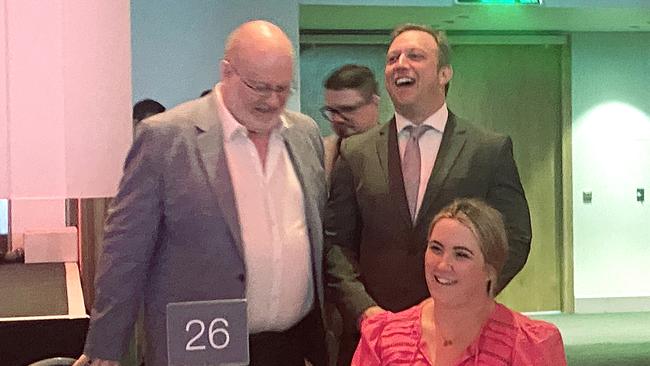
Hardly a day went by in the campaign when Crisafulli didn’t make an announcement focused on law and order: more funding for crime victim support, sleep-away camps for at-risk youths, and an overhaul of the state government’s troubled DNA laboratory, to name just a few of the LNP’s offerings.
But things began to come apart in week two when his former cabinet colleague, Jann Stuckey, publicly voiced concerns the LNP might roll back abortion and voluntary assisted dying reforms after the election.
Stuckey’s comments came as video emerged of two sitting LNP MPs expressing pro-life views and their desire to have access to abortion tightened.
Crisafulli faced intense and sustained questioning over his personal beliefs on abortion, the staunch pro-life views expressed by his candidates and evident desire of some in his partyroom to wind back reforms. While he tried to cauterise the damage, his refusal to answer direct questions about his personal beliefs or whether LNP MPs would be given a conscience vote on potential crossbench legislation meant the story dragged on – diverting attention from the themes Crisafulli wanted to prosecute.
“I think a gamble was taken, thinking the issue would just fade away after a few days. They really should have neutralised it earlier,” one LNP source said. Another experienced LNP campaigner told The Australian even Crisafulli believed he had let the abortion issue “get away from him.”
“He acknowledged it got a lot of traction. I don’t think he realised how quick and how fast it got away from him,” they said.
Abortion will be on the agenda when the LNP’s governing State Council next meets, with some conservative members of the party professing shock at Crisafulli’s belated declaration at last week’s final leader’s debate that he was pro choice. The issue is not going away when the Katter Party has vowed to reintroduce legislation in the new parliament that could open up tightening of the 2018 reforms in Queensland.
Overall, LNP operatives were keen to stress how monumental Saturday’s win was against the human and cash resources of the union movement, a compulsory preferential voting system they say favours Labor and minor parties and the “financial gerrymander” of the ban introduced by Labor on donations from property developers.
Queensland’s union movement spent more than $2.5m running parallel campaigns to Labor, supporting the government and attacking the LNP on abortion and alleged planned “secret cuts” to the public service.
Labor’s electoral caps on political party campaign spending and the developer donation ban ensured the union movement’s deep pockets would play a major role in the election. Under the electoral changes, registered third parties could spend as much as political parties in the campaign.
More than half of the 37 registered third parties in the campaign were unions, with the biggest spender believed to be the public sector union, Together. It’s understood the union, headed by Alex Scott, spent just over $1m on TV ads, social media and leaflet drops.
The United Workers Union, headed by Steven Miles’ self-described political mentor Gary Bullock, came close to the million dollar mark in its campaign.
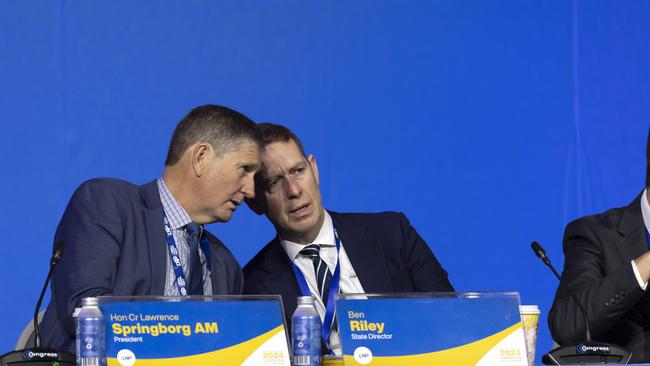
The Crisafulli campaign was led from the party’s Albion headquarters by state director Ben Riley, a former head of the Queensland Young LNP and federal Young Liberals, and a staffer in the former Perrottet NSW Liberal government. Queensland senator James McGrath, a renowned number cruncher who ran the LNP’s successful 2012 election and worked for Boris Johnson when he was London mayor, also had a central strategy role.
Riley told The Australian on Sunday Crisafulli has assembled a “really strong team with a really strong culture”. “Put it this way, they had hundreds of ministerial staffers, we had a group probably 20 per cent the size of theirs,” he said, referring to the Miles team. “It was the people who made the difference – their hard work and their dedication over years.”
On the Labor side, the campaign was run out of the party’s South Brisbane headquarters by Kate Flanders, who has been in the job since June 2022 after serving as assistant secretary of the left-aligned Together Union.
While there is some disquiet among Labor candidates and MPs about organisation – including that postal votes for Labor supporters were not in the field early enough – there’s a widespread view the ALP campaign stemmed the potential losses that were feared under Palaszczuk.
Crisafulli may have derided Miles’s TikTok-heavy campaign, but Labor strategists say the social media onslaught helped the ALP win back young urban voters from the Greens, and stave off the assault by the minor party in its four target Brisbane seats.
A senior Labor source said resources were shifting as the campaign went on. “There was a point a couple of months ago when everything was pulled out of Townsville and that was the right call,” the source said. “There were a lot of voters in the regions that had decided a long time ago that they were not going to vote for us, the baseball bats were out in Mackay and Rockhampton.
“There were MPs who won their seats in 2015 that just didn’t put a lot of work in and I think that is because they had never had to run tight campaigns before. Some of those MPs in outer suburban seats, like Nikki Boyd (in Pine Rivers) and Don Brown (in Capalaba), were caught off guard. Don Brown didn’t even have a campaign manager.”
Additional reporting: Mackenzie Scott

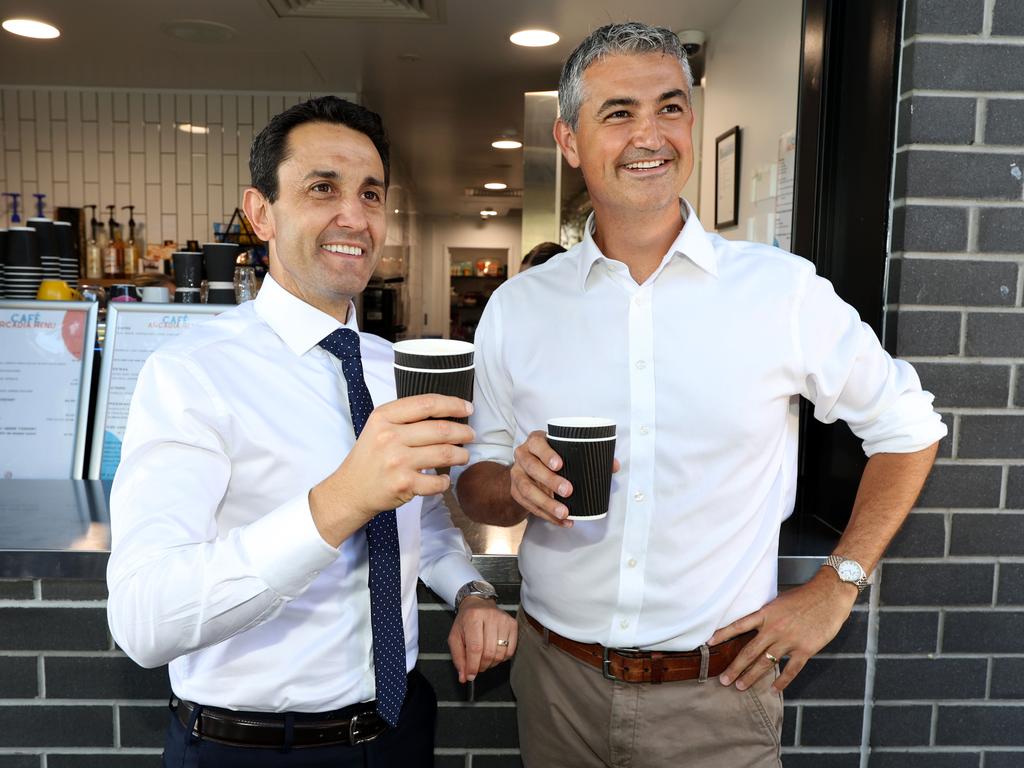

To join the conversation, please log in. Don't have an account? Register
Join the conversation, you are commenting as Logout